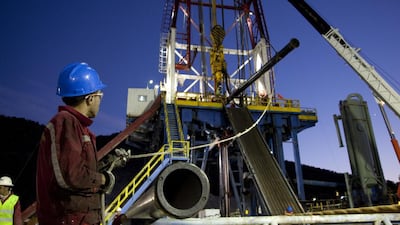Abu Dhabi National Energy Company, better known as Taqa, reported an 39 per cent annual rise in second-quarter net income amid higher commodity prices.
Net profit for the three months to the end of June rose to Dh1.42 billion ($386.9 million) from the same period a year earlier, Taqa said in a statement to the Abu Dhabi Securities Exchange, where its shares are traded.
Revenue for the reporting period rose 19 per cent to Dh11.9bn, from the second quarter of 2020, boosted by income from the transmission and distribution of utilities
"Against the backdrop of favourable market conditions, we continue to adopt a prudent financial policy, which saw us fully repay our corporate credit facilities this quarter and increase available liquidity," said Taqa group chief executive Jasim Thabet.
"We also continue to focus on achieving operational efficiencies within our utilities business and progressing our growth strategy to become a low carbon power and water champion."
The company's board approved an interim cash dividend of Dh618m at the rate of 0.55 fils per share. This is the company's second dividend payout for the current financial year.
The company's average oil and gas output rose to 124,200 barrels of oil equivalent per day, supported by higher production in Europe, particularly in the UK.
The group's capital expenditure fell 3 per cent to Dh2bn at the end of June 30.
Taqa said it had free cash flow of Dh7.4bn, allowing the company to fully repay revolving credit facilities.
"We have delivered two interim dividend payments, refinanced maturing debt at record-low rates, broken ground on what will be the world’s largest single-site solar project, unveiled a 10-year growth strategy and recently signed two MoUs [memorandums of understanding] for the development of green hydrogen," said Mr Thabet.
Taqa is looking to increase the share of renewable energy in its portfolio to 30 per cent by 2030. The clean power is set to largely come from solar photovoltaic cells.
Earlier this month, the company signed an agreement to supply Emirates Steel with green hydrogen – a move that could bolster the UAE's efforts to lower the emissions of its energy-intensive industrial activities.
Hydrogen is used as a reducing agent in steel production, replacing the more polluting coal, which countries around the world are seeking to phase out.
Green hydrogen uses renewable energy to power electrolysis, which splits water molecules into hydrogen and oxygen.
Hydrogen has become a top investment priority for oil-exporting Gulf countries. Earlier this year, Adnoc, Mubadala and holding company ADQ formed an alliance for the development of green and blue hydrogen.
Last month, the company also signed an agreement with Abu Dhabi Ports to develop a 2-gigawatt green ammonia project in the UAE.
Green ammonia is an industry allied with the hydrogen economy. Green hydrogen produced through clean sources is converted to ammonia, which can be easily transported and reconverted into the fuel for power generation or for use as a fertiliser.


